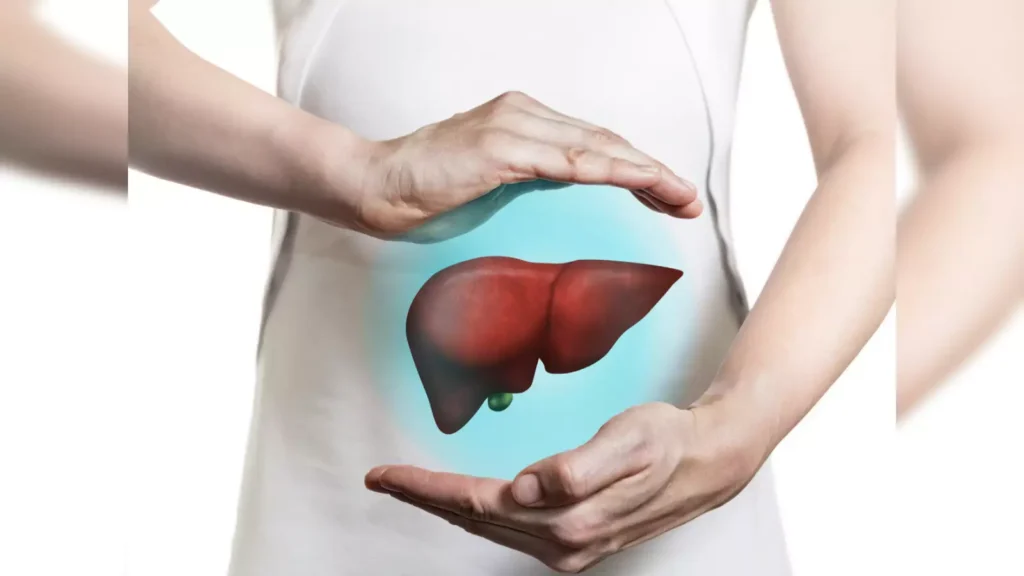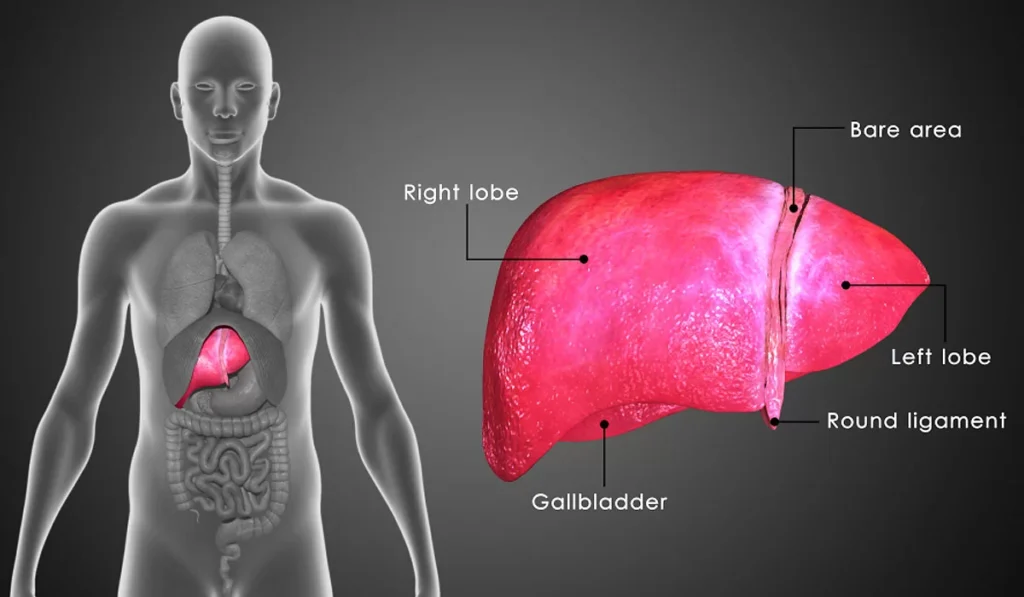Top 20 signs that your liver is not healthy

Your liver is a vital organ responsible for numerous functions crucial to your overall health. From filtering blood to metabolizing nutrients and detoxifying harmful substances, the liver plays a pivotal role. Ensuring its health is essential for a vibrant life. However, various signs and symptoms may indicate that your liver is not functioning optimally.
Symptoms of Liver Dysfunction
Yellowing of the skin and eyes (Jaundice)
One of the most noticeable signs of liver trouble is jaundice, characterized by yellowing of the skin and whites of the eyes. This occurs when the liver fails to process bilirubin properly, leading to its buildup in the bloodstream.
Abdominal pain and swelling
Liver dysfunction can manifest as abdominal discomfort or swelling. This may be due to inflammation or an enlarged liver (hepatomegaly), indicating an underlying problem that needs attention.
Persistent fatigue and weakness
Feeling constantly tired and weak despite adequate rest could be a sign of liver issues. The liver’s inability to store glycogen properly or produce enough energy can result in persistent fatigue.
Nausea and vomiting
Liver problems may cause nausea and vomiting, especially after meals or when consuming fatty foods. These symptoms can occur due to reduced bile production, affecting digestion.
Loss of appetite and weight loss
A diminished appetite and unexplained weight loss could signify liver dysfunction. When the liver is unhealthy, it may struggle to produce bile needed for fat digestion, leading to decreased appetite and weight loss.
Dark urine
The presence of dark-colored urine, often resembling cola or tea, may indicate liver trouble. This discoloration occurs due to the excretion of bilirubin into the urine, a process disrupted when the liver is not functioning correctly.
Pale, bloody, or tar-colored stool
Changes in stool color can also be indicative of liver issues. Pale or clay-colored stools suggest a lack of bile, while bloody or tar-colored stools may indicate bleeding in the digestive tract, which can be linked to liver conditions.
Swelling in the legs and ankles (Edema)
Liver dysfunction can lead to fluid retention in the body, causing swelling in the legs and ankles known as edema. This occurs due to decreased protein production by the liver, leading to fluid imbalance.
Itchy skin
Persistent itching, often more intense at night, can be a symptom of liver problems. The accumulation of bile salts in the bloodstream due to liver dysfunction can irritate the skin, leading to itching.
Easy bruising
If you find yourself bruising easily or noticing bruises that take longer to heal, it could be a sign of liver dysfunction. The liver plays a crucial role in blood clotting, and impaired function can lead to easy bruising.
Spider-like blood vessels on the skin (Spider angiomas)
Spider angiomas are small, spider-like blood vessels that appear on the skin’s surface, particularly on the face and upper body. These can be indicative of liver disease, especially when accompanied by other symptoms.
Confusion or difficulty concentrating
Hepatic encephalopathy, a condition characterized by confusion, difficulty concentrating, and changes in behavior, can occur when the liver is unable to remove toxins from the bloodstream effectively.
Personality or mood changes
Liver dysfunction can affect brain function, leading to mood swings, irritability, or depression. Changes in personality or behavior may indicate hepatic encephalopathy or other liver-related complications.
Sleep disturbances
Trouble sleeping, such as insomnia or disrupted sleep patterns, can be linked to liver dysfunction. Elevated levels of ammonia in the bloodstream, resulting from impaired liver function, can disrupt sleep cycles.
Increased sensitivity to alcohol and drugs
When the liver is compromised, its ability to metabolize alcohol and drugs diminishes, leading to increased sensitivity and adverse reactions. Even moderate amounts of alcohol can exacerbate liver damage in such cases.
Complications of Liver Dysfunction
Liver cirrhosis
Liver cirrhosis is a late-stage liver disease characterized by scarring of the liver tissue. It can result from various conditions, including chronic alcoholism, hepatitis B or C infection, and non-alcoholic fatty liver disease (NAFLD).
Liver cancer
Chronic liver disease, particularly cirrhosis, increases the risk of developing liver cancer. Early detection and treatment of liver cancer are essential for better outcomes.
Hepatic encephalopathy
Hepatic encephalopathy is a serious complication of liver disease, marked by cognitive impairment and altered consciousness. It requires prompt medical attention to prevent further neurological damage.
Ascites (fluid buildup in the abdomen)
Liver dysfunction can lead to ascites, the accumulation of fluid in the abdominal cavity. This condition indicates advanced liver disease and requires medical management to alleviate symptoms and address underlying causes.
Portal hypertension
Portal hypertension is high blood pressure in the portal vein system, often resulting from liver cirrhosis. It can lead to complications such as variceal bleeding and requires careful monitoring and treatment.
Prevention and Management
Maintaining liver health is crucial for overall well-being. Adopting healthy lifestyle habits can help prevent liver disease and minimize its progression.
Healthy lifestyle choices
Making healthy lifestyle choices, such as maintaining a balanced diet, engaging in regular exercise, and avoiding excessive alcohol consumption, can promote liver health.
A balanced diet rich in fruits and vegetables
A diet rich in fruits, vegetables, whole grains, and lean proteins provides essential nutrients that support liver function and overall health.
Regular exercise
Regular physical activity helps reduce the risk of fatty liver disease and promotes weight management, which is essential for liver health.
Limiting alcohol intake
Excessive alcohol consumption can damage the liver over time, leading to liver disease. Limiting alcohol intake or abstaining altogether is crucial for liver health.
Avoiding exposure to toxins and chemicals
Minimizing exposure to environmental toxins and chemicals, such as pesticides and industrial pollutants, can reduce the risk of liver damage.
Hepatitis vaccinations
Getting vaccinated against hepatitis A and B can help prevent viral hepatitis, a leading cause of liver disease.
FAQs
What are the common causes of liver damage?
Liver damage can occur due to various factors, including excessive alcohol consumption, viral hepatitis infections (such as hepatitis B and C), non-alcoholic fatty liver disease (NAFLD), autoimmune hepatitis, and certain medications or toxins.
How often should I get my liver checked?
It is advisable to undergo regular liver function tests as part of routine health check-ups, especially if you have risk factors for liver disease. Your healthcare provider can recommend the appropriate frequency based on your individual health status and risk factors.
Can liver damage be reversed?
In some cases, liver damage can be reversed, especially if detected early and appropriate lifestyle changes are made. However, advanced liver disease, such as cirrhosis, may be irreversible and require medical management to prevent further complications.
What are some natural remedies for liver health?
Certain herbs and supplements, such as milk thistle, dandelion root, and turmeric, are believed to support liver health. However, it’s essential to consult with a healthcare professional before using any natural remedies, as they may interact with medications or have adverse effects.
Are there specific foods to avoid for liver health?
Processed foods high in sugar, salt, and unhealthy fats should be limited for optimal liver health. Additionally, reducing alcohol consumption and avoiding raw or undercooked shellfish can help protect the liver.
Is liver damage reversible?
While some liver damage can be reversed with lifestyle changes and medical treatment, advanced liver disease may be irreversible. Early detection and intervention are crucial for better outcomes.




Leave a Comment